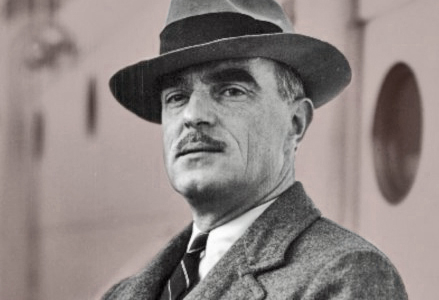
In the letter below Thornton Wilder addresses the writer Michaela O’Harra. O’Harra was the founder and director of the New Dramatists, a collective which aimed to encourage and promote the work of young playwrights. After sharing some of her own thoughts on the project, she asked Wilder for general advice on how to foster creative talent in the theater. Note Wilder’s insistence that drama remain an unfiltered representation of reality for all to witness, rather than a superficial account of life targeted to a specific audience. He held the theater to be the highest of all mediums, not because it was art for art’s sake but rather “experience for experience’s sake.”
April 2, 1954
Dear Miss O’Harra:
In a way I ought to be ashamed of having asked that you give up so much time to write me a letter—but the letter’s such an admirable piece of exposition that I’m going to hold it—or lend it back to you—in order to enlighten others also.
I have no skill nor practice in the form of exposition that you do so well. Let me just try a few jottings.
Older I grow I see that playwrights (in the early stages) discover and nourish themselves in only one way: being in the theater, hanging around theaters. Fifty hours backstage are worth a thousand in audience-seats.
So I think very little of playwriting classes. (Prof. Baker was a magnet only; potential dramatists went to him; but his two most gifted, O’Neill and Wolfe, left after a short time—In his nine years at Yale, he “made” no playwrights, except Paul Osborne and Paul didn’t even finish his one year.) Discussion groups—workshops in which they read to one another—are a little better—but only for courage, not for content.
Think of all our masters who worked backstage first. They don’t even have to have been associated with good plays, (Ibsen at Bergen, wasn’t); it’s enough they smell the pain and the audience and the working from that side of the curtain. (Composers don’t go to concerts!)
Next best is attendance at rehearsals. (You note I put very little faith in attendance at performance—as a member of the public.) You kindly refer to me: let me state my youthful formation. In the grammar school and high school of Berkeley, California, it would seem that I’d have little chance to know backstage theatre; but now: Margaret Anglin, and Maude Adams, and Edith Wynne Matheson [sic], and the University’s English Club were always putting on plays in the Greek theatre; and I climbed walls and was thrown out by guards and behind back rows, but I saw hundreds of hours of rehearsals.
When painters and composers get together they don’t talk about content (in content, no one can help you and you don’t want anyone to help you), they talk about fabric, about medium, and all those things that go under the head of technical resources.
So much for the formation.
Now the plays are being written.
Is silence and solitude and isolation and leisure necessary for playwriting? It certainly is for poetry and musical composition. It is probably desirable for all artistic work. But most dramatists we read about seemed to have lived in a city turmoil—Goldoni and Congreve and Shaw and beaumarchais and Sheridan, to name some in the second rank…
At present our off-Broadway theatres are our most hopeful market for gifted young playwrights—but there’s a kind of danger in it, too. In the theatre one writes for PEOPLE,—not for people-of-a-certain-taste. Off-Broadway theatre tends to please other interests before basic theatre storytelling: sociological tendency; a poetic-literary spinning…
So I suggest:
(1) Divert playwrights to be stage managers. Use funds, if necessary to buy them jobs as assistant stage managers in summer theatres.
(2) See if Broadway shows won’t let them sit backstage on the electrician’s bench.
(3) For their “time to write”, arrange to select your most promising playwrights and…buy a shack at Cape hatteras…
Do not be too tender-hearted about their careers. What poets we admire have earned their living by their pen? Marianne Moore, a librarian; William Carlos Williams, a Pediatrician; Wallace Stevens, an insurance executive. Dozens of us have been teachers. It’s too bad. It’s probably hurt us, but it’s only killed a few of us. But the one thing “we” didn’t do was to write rubbish in order to earn the money to write literature.
A dramatist will be helped by doing a man’s task of earning a living, but he will only be harmed by using his faculties as a dramatist in writing what he cannot respect. I have seen it over and over again in my pupils and young friends who have done routine Hollywood or routine radio and advertising writing.
Well, now, I haven’t been much use to you. I’m sorry. We are all impatient for the next crop of playwrights who will bring some quality into the Broadway scene…Thousands of plays are being written by young people (and the postman certainly brings me a lot of them). Their principal shortcoming—(that they aren’t superior writing)—we can do nothing about. Their next shortcoming—that they lack basic stage-movement—can only be improved by extended frequentation of theatre-in-production. Not advice; not guidance; not round-table discussion; not theatre-attendance; not (and here you’ll be angry with me) not primarily a production of their own plays, (in production of one’s own plays, so much anxiety and ego-susceptibility, and hopes ‘n fears, and impulsive advice from Tom, Dick and Harry are involved; that there’s little clear mind left to learn anything).
Lots of best wishes—
Sincerely yours,
Thornton Wilder
From: The Selected Letters of Thornton Wilder. Edited by Robin G. Wilder and Jackson R. Bryer (2008)
FURTHER READING
“We are all equally distant from the sun”: Wilder’s interview at The Paris Review.
A brief history of the New Dramatists.
Wilder is often referenced as a great stylist of prose.


